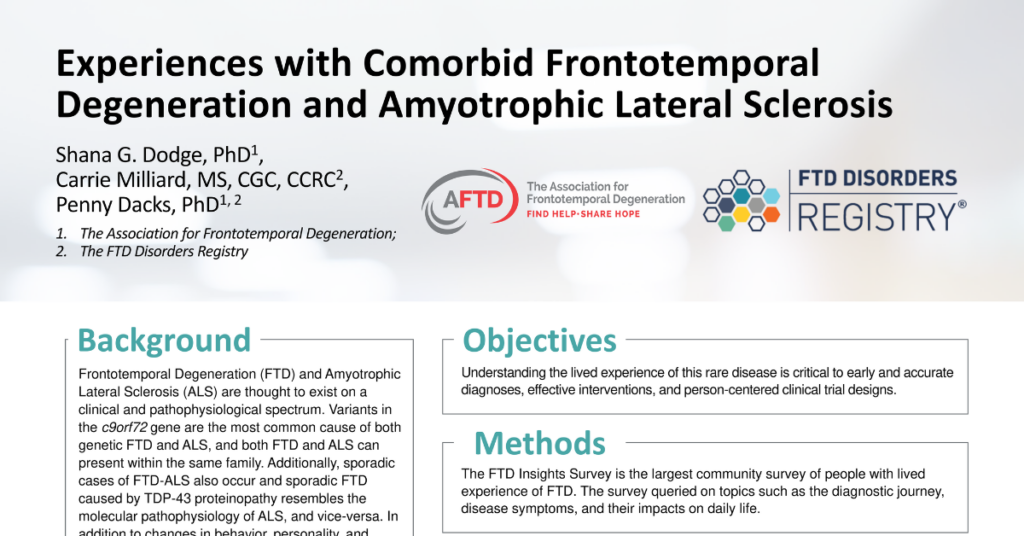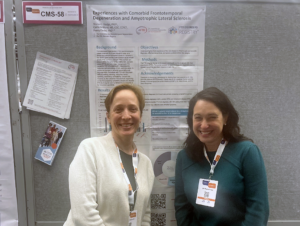PRESS & NEWS
Research Highlight: Experiences with Comorbid FTD and ALS

The FTD Insights Survey is the largest community survey of people with lived experience of FTD disorders. This survey queried on topics that included the diagnostic journey, disease symptoms, and their impacts on daily life. Shana Dodge, PhD, AFTD’s Director of Research Engagement, used data from the FTD Insights Survey in a poster session at…
 The FTD Insights Survey is the largest community survey of people with lived experience of FTD disorders. This survey queried on topics that included the diagnostic journey, disease symptoms, and their impacts on daily life. Shana Dodge, PhD, AFTD’s Director of Research Engagement, used data from the FTD Insights Survey in a poster session at the 35th International Symposium on Amyotrophic Lateral Sclerosis (ALS)/Motor Neuron Disease (MND), held December 6-8, 2024 in Montreal Canada.
The FTD Insights Survey is the largest community survey of people with lived experience of FTD disorders. This survey queried on topics that included the diagnostic journey, disease symptoms, and their impacts on daily life. Shana Dodge, PhD, AFTD’s Director of Research Engagement, used data from the FTD Insights Survey in a poster session at the 35th International Symposium on Amyotrophic Lateral Sclerosis (ALS)/Motor Neuron Disease (MND), held December 6-8, 2024 in Montreal Canada.
The poster presented experiences with comorbid frontotemporal degeneration (FTD) and amyotrophic lateral sclerosis (ALS).
FTD and ALS are believed to exist on a shared clinical and pathophysiological spectrum. Variants in the c9orf72 gene are the most common genetic cause of both conditions, and FTD and ALS can co-occur within the same family. Sporadic cases of FTD-ALS also arise, and FTD caused by TDP-43 proteinopathy closely mirrors the molecular pathophysiology of ALS, and vice versa.
In addition to behavioral, personality, and language changes, individuals with FTD-ALS may experience difficulties with mobility, hand function, speech, swallowing, and breathing. However, clinical care for FTD and ALS is often siloed—patients are typically seen by behavioral neurologists or movement specialists based on their initial symptoms.
A total of 73 respondents shared their lived experiences with FTD-ALS, including 10 individuals diagnosed with the disease and 63 care partners responding on behalf of a diagnosed person (not matched dyads).
Misdiagnosis was common, with 63% of respondents initially receiving an incorrect diagnosis, most frequently depression (32%), anxiety (22%), or Alzheimer’s disease (12%).
The diagnostic journey was often lengthy—86% of respondents consulted more than three doctors before receiving an accurate FTD-ALS diagnosis, and 18% saw more than five doctors.
Among current care partners, 30% reported that the diagnosed individual had little to no awareness of their symptoms.
One third of persons diagnosed (33%) reported that changes in language were their most distressing symptom, with others citing no distress (22%); other symptoms including motor symptoms, relationships, sleep, delusions/hallucinations and a specific difficulty in everyday life (22%); memory (11%), and thinking (11%).
Care partners had a different experience with one third citing other symptoms including motor symptoms, relationships, sleep, delusions/hallucinations and a specific difficulty in everyday life as their most distressing symptom (33%); followed by personality (30%); mood (14%); language (13%); and thinking (10%).
When asked what they would most want in a treatment, 67% of respondents answered the ability to maintain independence in everyday activities, followed by the ability to communicate (64%), the quality of relationships with family and friends (63%), the ability to control emotions and behavior (56%), and the ability to hold a job (21%).
Though these results are based on a small sample size, the findings indicate that individuals who are ultimately diagnosed with FTD-ALS often face significant challenges in receiving a timely and accurate diagnosis.
Delayed and incorrect diagnoses can lead to missed opportunities for appropriate care and support. Increased awareness among healthcare providers and improved diagnostic pathways are crucial to addressing these challenges.
Shana worked on this poster with support from Registry Director Carrie Milliard, MS, CGC, CCRC and Penny Dacks, PhD, AFTD’s Senior Director of Scientific Initiatives and President of the FTD Disorders Registry. Support was also provided by Dr. Jonathan Rohrer and the Genetic Frontotemporal Dementia Initiative (GENFI), Dr. Adam Boxer, and Dr. David Knopman who assisted with survey creation and distribution.
Together we can find a cure for ftd
The FTD Disorders Registry is a powerful tool in the movement to create therapies and find a cure. Together we can help change the course of the disease and put an end to FTD.
Your privacy is important! We promise to protect it. We will not share your contact information.



